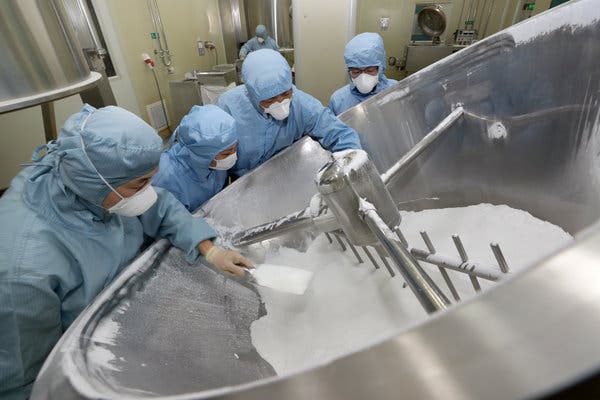Advertisement
An Arizona man and his wife ingested a fish tank cleaning additive made with the same active ingredient as chloroquine phosphate, which President Trump has referred to as a “game changer.”

An Arizona man died and his wife was hospitalized after officials said they treated themselves on Sunday with a deadly home remedy for the new coronavirus — a popular fish tank additive that has the same active ingredient as an anti-malaria drug.
The drug, known as chloroquine phosphate or chloroquine, has been bandied about by President Trump during White House briefings on the coronavirus pandemic as a potential “game changer” in the treatment of Covid-19.
The couple, who officials at Banner Health, a hospital system based in Phoenix, said were in their 60s and were from Maricopa County, quickly experienced side effects that included nausea and vomiting. They were not tested for the coronavirus.
The man died from cardiac arrest and his wife was initially listed in critical condition, according to hospital officials, who said on Monday that the woman had been upgraded to stable condition and was expected to make a full recovery. Their names were not released.
Dr. Daniel Brooks, medical director of the Banner Poison and Drug Information Center, said in an interview on Monday night that the couple’s attempt to self-medicate was a cautionary tale.
“It’s incredibly dangerous and foolish for people to be doing this,” he said. “This is not going to be a magic pill for us to get us through this.”
Dr. Brooks said the couple had read about chloroquine phosphate on the internet, which he said was cluttered with a lot of misinformation about treatments for Covid-19, the disease caused by the new coronavirus. He said the public should rely on authoritative sources such as the Centers for Disease Control and Prevention, the World Health Organization and state health officials for medical advice — not the internet or politicians.
“You need to listen to the scientists,” he said. “People are panicking and making decisions based on symptoms without being tested.”
The woman told NBC News on Monday that she had heard Mr. Trump make repeated mentions of chloroquine during recent White House briefings on the coronavirus and that she used chloroquine phosphate to treat her koi fish.
“I saw it sitting on the back shelf and thought, ‘Hey, isn’t that the stuff they’re talking about on TV,’ ” said the woman, who was not named by NBC.
The White House did not immediately respond to a request for comment on Monday night.
During a briefing on Friday, Mr. Trump suggested that two long-used malaria drugs, chloroquine and hydroxychloroquine, could be effective in the treatment of the coronavirus. The drugs are being tested in clinical trials.
At the same news conference, Dr. Anthony S. Fauci, the director of the National Institute of Allergy and Infectious Diseases since 1984, said there had been only anecdotal evidence that the drugs may be effective. As of yet, no drugs have been approved in the United States for the treatment of the coronavirus.
In Nigeria, health officials recently reported some episodes of hospitals treating patients for chloroquine poisoning.
The fish tank additive is used to eliminate algae and to treat the white spot condition commonly known as ich. On eBay, prices for the additive have spiked during the coronavirus pandemic.
Dr. Brooks said 85 percent of people who get the coronavirus don’t need medical treatment. As of Tuesday morning, the coronavirus had a fatality rate of about 1.2 percent in the United States, according to health officials. Dr. Brooks said antiviral medications were used only in patients who had tested positive and are critically ill. The medications need to be closely monitored because they can have serious side effects, he said.



